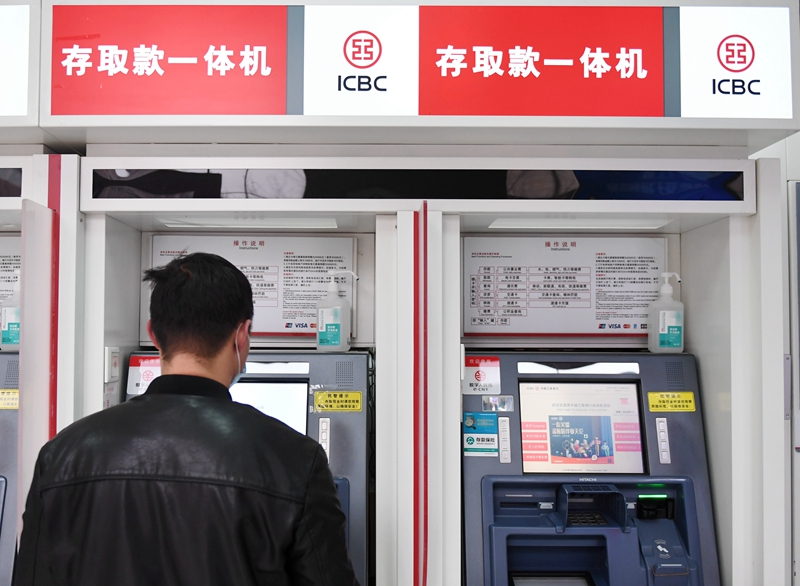One crucial question remains: How will this digital currency fare in daily life?
Hot topics
Throughout its dynastical history, China was reputed for being a major contributor to science in terms of discoveries and inventions—just think papermaking, the compass, gunpowder and movable-type printing—all of which have had a considerable impact on the evolution of humanity.
Even in modern times China has stayed true to its carefully crafted reputation for innovation through the introduction of new creations such as its high-speed railways, QR-based digital payment solutions, dockless bike-sharing services and online shopping platforms, which have generated a boost to economic development.
In the last decade, China's relentless technological and digital evolution has mostly homed in on the financial services industry. This focus, in turn, has helped mold a country that originally invented paper money during the Song Dynasty (960-1279) into a leader in the rising fintech sector—courtesy of a high smartphone penetration in the domestic market.
Recent actions and subsequent dynamics have witnessed Beijing emerging in pole position for the future national rollout of the digital yuan, after putting it to the test through a lottery-based system. They clearly signaled that the authorities had reached a substantial level of confidence and built up expertise from previous pilot programs conducted across less complex and sensitive urban areas in the country.
On June 18, Xinhua Finance reported that the Beijing branches of two of the largest state-owned banks, Industrial and Commercial Bank of China (ICBC) and Agricultural Bank of China (ABC), started to offer cash exchange services for the digital yuan. This feature, initially available only in Beijing, authorizes customers to reciprocally convert the digital yuan to cash at over 3,000 ICBC ATMs and more than 10 ABC ATMs in the Wangfujing shopping district through a two-minute process requiring a digital wallet setup, identity verification, QR scan and transaction authorization.
The digital yuan ATM service represents an important effort toward increasing digital currency circulation, particularly when compared to the previous pilot programs based on a lottery system. However, one must underline that the ATM system has fallen out of favor among Chinese citizens following the introduction of mobile payments and the ensuing overall shift toward a cashless society.
On June 30, the China Global Television Network reported that, according to the Beijing Municipal Commission of Transport, Beijing Subway already accepts the digital yuan for payments through ICBC-provided digital wallets and personal smart devices. The new program allows for the use of the digital cash payments at all station gates along the city's 24 underground lines and four suburban rail lines.
These latest announcements reveal a keen combination of strategic planning, operational efficiency and strong determination in order to become a pioneer in what has been labeled "the future of money."

A bank employee helps a client download the digital yuan wallet app to her smartphone in Beijing on June 16 (XINHUA)
Lining up, rolling out
Beijing's decision to partner up with ICBC in both trials is not a totally unexpected move considering the bank's large amount of investments made in scaling up technological innovation, the development of its fintech-dedicated research center in Beijing's Xicheng District, as well as its highest market share and largest number of active bank accounts among all banks across China. The popularity of ICBC among Chinese citizens may have been another reason behind the decision to extend, at least in the initial phase, exclusivity to ICBC bank account holders when it comes to using the digital yuan to pay for Beijing Subway fares.
The adoption of the digital yuan inside Beijing's subway network signifies what is arguably the best and most effective way to generate an immediate increase in circulation of a sovereign digital currency considering that Beijing Subway is the world's busiest metro system—with a single average day ridership of nearly 12 million.
One noteworthy aspect here is that Beijing Subway has always been quite sluggish to adopt new payment methods over the years. As a daily user of its services for the last seven years, I have to admit that the transition from a plastic card that could only be recharged with cash to a fully digitalized mobile payment system took a while compared to the receptiveness of other commercial activities. Therefore, the announcement of being able to pay for your daily subway commute using the digital yuan is, to me, a surprising one. One that now places the metro system at the forefront of Beijing's technological innovation, even.
Taking into account China's official goal to have a fully functioning digital yuan for the Beijing 2022 Olympic Winter Games, it is very likely we will see a further extension of sovereign digital currency acceptance, stretching from the urban metro system to the high-speed rail network, in the not too distant future.
A successful launch across all main transportation networks, as well as a further acceptance in stores, restaurants, hotels and tourist attractions, and a further state-owned and private business participation in pilots via salary payments, would make the digital yuan an even more important part of Beijing daily life.
The future of finance, is now.















